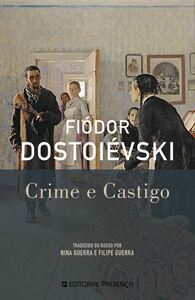Take a photo of a barcode or cover
challenging
dark
reflective
slow-paced
Graphic: Animal cruelty
dark
reflective
tense
slow-paced
Plot or Character Driven:
Character
Strong character development:
Complicated
Loveable characters:
Complicated
Flaws of characters a main focus:
Yes
Graphic: Mental illness, Violence, Murder
Moderate: Addiction
Minor: Panic attacks/disorders, Sexual harassment
“ if you you keep talking big nonsense you will get to sense “ “ if you’re going to give me big nonsense better make it your own big nonsense, and i’ll kiss you for it. talk nonsense in your own way. that’s almost better than talking sense in somebody else’s” my very beloved razumikhin was with no doubt my favorite character the way he stuck for raskolnikov and his family and the way he went and searched for those good stuff raskolnikov did. raskolnikov was very lucky to have him as a bestfriend even though he tells himself he doesn’t see him that way.
i loved raskolnikov i hated raskolnikov i related to raskolnikov. this book morally challenged me and left me staring at a blank wall multiple times, questioning.
i think everyone should read this at some point of their lives.
i loved raskolnikov i hated raskolnikov i related to raskolnikov. this book morally challenged me and left me staring at a blank wall multiple times, questioning.
i think everyone should read this at some point of their lives.
reflective
tense
slow-paced
Plot or Character Driven:
Character
Strong character development:
Yes
Loveable characters:
Yes
Diverse cast of characters:
Complicated
Flaws of characters a main focus:
Yes
dark
reflective
tense
The first book made me unwell for several days. This effect was lost post-murder to subplots, which I was grateful for. I don’t understand why Sonya loved Rodion, except maybe that he was the only option. The moral was the same as that of the Brothers Karamazov, with Rodya as Ivan. However, I loved the faster pace of this one and the depth of Rodya’s personality. I wish I had more to say.
When I first began reading this book, I did not like it. It was so... dark. This novel is really about a man who is from the Underground. He is lost within his own self. Reading it was frustrating and painful and depressing.
But then it changed. And hope reared it's ugly head. And before I know what happened, I was on the edge of my seat. The book is amazing.
When i finally laid it down, I got down on my knees, and literally wept over the darkness of my soul and the grace it took to deliver me. Hope barely rears her head... but what hope.
But then it changed. And hope reared it's ugly head. And before I know what happened, I was on the edge of my seat. The book is amazing.
When i finally laid it down, I got down on my knees, and literally wept over the darkness of my soul and the grace it took to deliver me. Hope barely rears her head... but what hope.
This is a book that I both struggled with and loved. Dostoevsky is incredible when it comes to capturing some of the harshest words, deeds, and thoughts in this novel. Riding along with Raskolnikov, stuck with his rants, theories and self-reproach, it can be hard to sit through. You can see Dostoevsky build on his work and themes from Notes from Underground, testing the limits of what he think we'll sympathize with.
Structure-wise, the novel often has these long passages of monologue packed dialogue, focusing on mid 19th century Russian political philosophy that required more patience than I'm used to. It also features incredible descriptive street and domestic scenes that hum with a real energy absent elsewhere, it was those moments that kept me reading.
That said, I found the epilogue somewhat incredulous, and something that ruins an incredible ending. This novel came out in 1867, 1885 if you measure by the first English translation, yet it still feels modern. By that metric, and for arguably inventing the psychological thriller genre, Crime and Punishment is a fine book that I would recommend, if you have the time and endurance to hang around a protagonist like Raskolnikov and long-winded philosophical discussions by not-so-virtuous men.
Structure-wise, the novel often has these long passages of monologue packed dialogue, focusing on mid 19th century Russian political philosophy that required more patience than I'm used to. It also features incredible descriptive street and domestic scenes that hum with a real energy absent elsewhere, it was those moments that kept me reading.
That said, I found the epilogue somewhat incredulous, and something that ruins an incredible ending. This novel came out in 1867, 1885 if you measure by the first English translation, yet it still feels modern. By that metric, and for arguably inventing the psychological thriller genre, Crime and Punishment is a fine book that I would recommend, if you have the time and endurance to hang around a protagonist like Raskolnikov and long-winded philosophical discussions by not-so-virtuous men.
I thought this novel brought a very interesting perspective in terms of morality and character. The plot was intriguing and the character arcs full of twist and turns.




